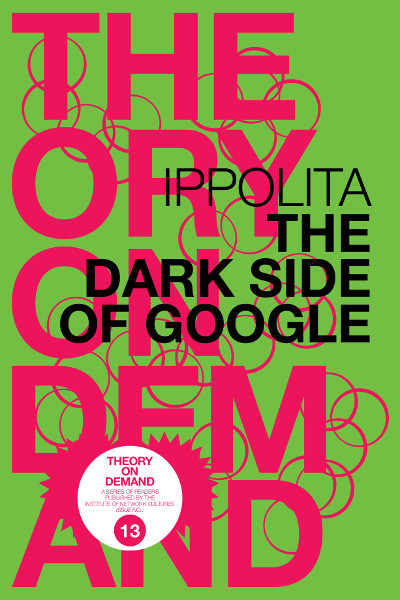Ippolita: The Dark Side of Google (2007–) [IT, FR, ES, EN]
Filed under book | Tags: · algorithm, capitalism, database, free software, google, open source, search, software, technology

In The Dark Side of Google Italian writers’ collective Ippolita provides a thorough, fresh analysis of what is behind the universe of Google and the metadata industry. In recent years Google has established itself as a major point of Internet access. We have progressively adapted to its sober, reassuring interface and its advertisements (discretely off to the side, yet always present). We have adopted its services and the habit of using it to the degree that ‘googling’ has become a form of behavior: ‘If you don’t know what it is, Google it!’
Google shows mastery in taking advantage of our need for simplicity. We sit in front of a colossus, an incredibly pervasive system of managing knowledge, comprising aggressive marketing and shrewd management of its own image, and the propagation of highly configurable interfaces that are still implacably recognizable. What is more, Google co-opts methods for developing Free Software, the use of futuristic systems for gathering and storing data. What lies behind the most consulted search engine in the world?
Italian edition
Publisher Feltrinelli, Milan, 2007
English edition
Translated by Patrice Riemens
Publisher Institute of Network Cultures, Amsterdam, 2013
Theory on Demand series, Vol. 13
Creative Commons Attribution Noncommercial No Derivative Works 3.0 Netherlands License
ISBN 9789081857567
110 pages
Luci e ombre di Google (Italian, 2007, draft)
La face cachée de Google (French, trans. Maxime Rovère, 2010, draft)
El lado oscuro de Google (Castilian, trans. Pino and Maria, 2010)
The Dark Side of Google (English, trans. Patrice Riemens, 2013)
Thomas Streeter: The Net Effect: Romanticism, Capitalism, and the Internet (2011)
Filed under book | Tags: · arpanet, capitalism, computing, history of computing, history of technology, internet, neoliberalism, technology

This book about America’s romance with computer communication looks at the internet, not as harbinger of the future or the next big thing, but as an expression of the times. Streeter demonstrates that our ideas about what connected computers are for have been in constant flux since their invention. In the 1950s they were imagined as the means for fighting nuclear wars, in the 1960s as systems for bringing mathematical certainty to the messy complexity of social life, in the 1970s as countercultural playgrounds, in the 1980s as an icon for what’s good about free markets, in the 1990s as a new frontier to be conquered and, by the late 1990s, as the transcendence of markets in an anarchist open source utopia.
The Net Effect teases out how culture has influenced the construction of the internet and how the structure of the internet has played a role in cultures of social and political thought. It argues that the internet’s real and imagined anarchic qualities are not a product of the technology alone, but of the historical peculiarities of how it emerged and was embraced. Finding several different traditions at work in the development of the internet—most uniquely, romanticism—Streeter demonstrates how the creation of technology is shot through with profoundly cultural forces—with the deep weight of the remembered past, and the pressures of shared passions made articulate.
Outstanding Academic Title from 2011 by Choice Magazine.
Publisher NYU Press, 2011
Critical Cultural Communication series
ISBN 0814741169, 9780814741160
221 pages
review (Yuenmei Wong, International Journal of Communication)
Comment (0)Jodi Dean: The Communist Horizon (2012)
Filed under book | Tags: · capitalism, communicative capitalism, communism, melancholia, neoliberalism, occupy movement, politics, proletariat, technology

“Rising thinker on the resurgence of the communist idea.
In this new title in Verso’s Pocket Communism series, Jodi Dean unshackles the communist ideal from the failures of the Soviet Union. In an age when the malfeasance of international banking has alerted exploited populations the world over to the unsustainability of an economic system predicated on perpetual growth, it is time the left ended its melancholic accommodation with capitalism.
In the new capitalism of networked information technologies, our very ability to communicate is exploited, but revolution is still possible if we organize on the basis of our common and collective desires. Examining the experience of the Occupy movement, Dean argues that such spontaneity can’t develop into a revolution and it needs to constitute itself as a party.
An innovative work of pressing relevance, The Communist Horizon offers nothing less than a manifesto for a new collective politics.”
Publisher Verso Books, London, 2012
Pocket Communism series
ISBN 1844679543, 9781844679546
256 pages
Author’s lecture (video, 79 min)
Interview with author (New Left Project)
Reviews: Samuel Grove (review31).
PDF (updated on 2020-5-31)
Comment (0)
